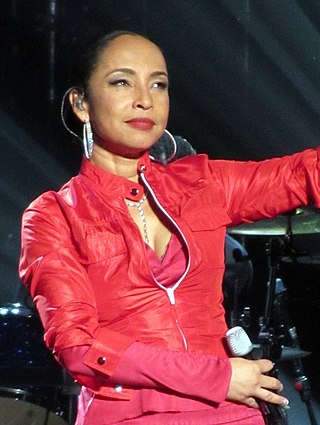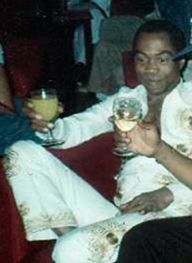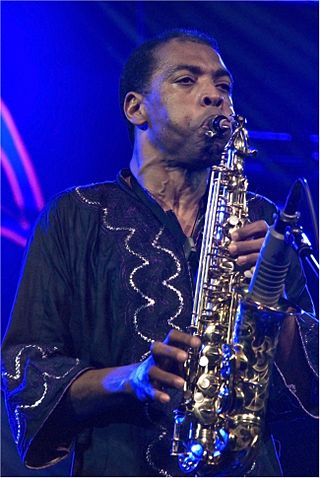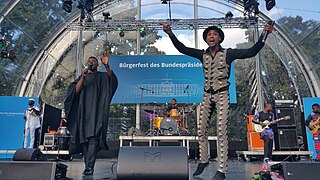
The Bee Gees were a musical group formed in 1958 by brothers Barry, Robin, and Maurice Gibb. The trio were especially successful in popular music in the late 1960s and early 1970s, and later as prominent performers in the disco music era in the mid- to late 1970s.

The music of Nigeria includes many kinds of folk and popular music. Little of the country's music history prior to European contact has been preserved, although bronze carvings dating back to the 16th and 17th centuries have been found depicting musicians and their instruments. The country's most internationally renowned genres are Indigenous, Apala, Aurrebbe music, Rara music, Were music, Ogene, Fuji, Jùjú, Afrobeat, Afrobeats, Igbo highlife, Afro-juju, Waka, Igbo rap, Gospel, and Yo-pop. Styles of folk music are related to the over 250 ethnic groups in the country, each with their own techniques, instruments, and songs. The largest ethnic groups are the Igbo, Hausa and Yoruba. Traditional music from Nigeria and throughout Africa is often functional; in other words, it is performed to mark a ritual such as the wedding or funeral and not to achieve artistic goals. Although some Nigerians, especially children and the elderly, play instruments for their own amusement, solo performance is otherwise rare. Music is closely linked to agriculture, and there are restrictions on, for example, which instruments can be played during different parts of the planting season.

Helen Folasade Adu, known professionally as Sade Adu or simply Sade, is a Nigerian-born British singer, known as the lead vocalist of her band Sade. One of the most successful British female artists in history, she is often recognised as an influence on contemporary music. Her success in the music industry was recognised with the Officer of the Order of the British Empire in 2002, and she was made Commander in the 2017 Birthday Honours.

Fela Aníkúlápó Kútì, also known as Abàmì Ẹ̀dá, was a Nigerian musician, bandleader, composer, political activist, and Pan-Africanist. He is regarded as the King of Afrobeat, a Nigerian music genre that combines West African music with American funk and jazz. At the height of his popularity, he was referred to as one of Africa's most "challenging and charismatic music performers". AllMusic described him as "a musical and sociopolitical voice" of international significance.

Chief Sunday Adeniyi Adegeye, known professionally as King Sunny Adé, is a Nigerian jùjú singer, songwriter and multi-instrumentalist. He is regarded as one of the first African pop musicians to gain international success, and has been called one of the most influential musicians of all time.

Olufela Olufemi Anikulapo Kuti, popularly known as Femi Kuti, is a Nigerian musician born in London and raised in Lagos. He is the eldest son of Afrobeat pioneer Fela Kuti and a grandchild of political campaigner, women's rights activist and traditional aristocrat Funmilayo Ransome-Kuti.
Chioma Ajunwa-Opara, MON, OLY – also known as Chioma Ajunwa – is a Nigerian former track and field athlete and football player, notable for becoming the first Nigerian to win gold at the 1996 Summer Olympics in Atlanta, and the first black African woman to win an Olympic gold medal in a field event. A member of the Nigerian Police Force, Ajunwa remains only woman to compete at both the FIFA Women's World Cup as a footballer and the Olympics as a track and field athlete.

Innocent Ujah Idibia MON, known by his stage name 2Baba, is a Nigerian singer, songwriter, record producer, entrepreneur, and philanthropist. Noted for his vocal range, lyrical depth, and longevity, he is widely regarded as one of Africa's greatest musicians of all time. He is most influential for the rise in popularity of Nigerian pop music in the 2000s, and his solo debut album Face2Face ushered in a new wave of awareness and reverence for Nigerian music amongst Africans on the continent and in diaspora. Prior to July 2014, he went by the stage name 2face Idibia. 2Baba was the first winner of the MTV EMA Best African Act category in 2005 and is one of the most awarded Nigerian musicians in history.

P-Square is a Nigerian Music duo, consisting of the twin brothers Peter Okoye and Paul Okoye, who co-write and co-produce much of their records. Noted for their artistic reinvention, musical versatility, and visual presentation, they are widely regarded as one of the most influential African Acts of all time and one of the most successful African Music Group internationally. They were integral to the evolution of the 2000s and 2010s African popular music. The duo was launched into the mainstream recognition following the release of the song “Senorita” in 2003, and later gain much wider recognition after the release of their sophomore album “Get Squared” in 2005. The success of the album earned them a nomination at the MTV EMA Best African Act in 2006. A prominent figure in the Africa popular culture of the 21st Century, P-Square was awarded the honorary "artiste of the decade," for their cultural impacts in the music industry between 2005-2015, at the MTV Africa Music Award 2015.
Christogonus Ezebuiro Obinna, alias Dr. Sir Warrior, was a Nigerian Igbo highlife musician, guitarist and bandleader who was the leader of the Oriental Brothers International Band which was famous in the Nigerian Igbo highlife music scene for several decades. He performed primarily in Nigeria, as well as performing internationally in places such as London and the United States of America with his crew.

Bernard Olabinjo "Bobby" Benson was an entertainer and musician who had considerable influence on the Nigerian music scene, introducing big band and Caribbean idioms to the Highlife style of popular West African music.

Olubankole Wellington, popularly known by his stage name Banky W and credited in film as Banky Wellington, is a Nigerian singer, rapper, actor, entrepreneur and politician.

Sir Shina Peters is a Nigerian Jùjú musician.

Damini Ebunoluwa Ogulu , known professionally as Burna Boy, is a Nigerian singer, songwriter and record producer. He rose to stardom in 2012 after releasing "Like to Party", the lead single from his debut studio album L.I.F.E (2013). In 2017, Burna Boy signed with Bad Habit/Atlantic Records in the United States and Warner Music Group internationally. His third studio album Outside (2018) marked his major-label debut. He is widely regarded as one of the most influential African artists of all time.
Igbo highlife is a contemporary musical genre which combines highlife and Igbo traditional music. It first started off in the southeast region of Nigeria, during the 1920s in Lagos. The genre is primarily guitar-based music, with rare characteristic blend of horns and vocal rhythms. Igbo highlife lyrics are sung mostly in Igbo with occasional infusion of Pidgin English. One of the most influential composers and performers of the music is Chief Stephen Osita Osadebe whose career spanned over 40 years. Osadebe's discography comprises numerous popular songs including the 1984 hit "Osondi Owendi" which launched him on the world stage as a pioneer of the Igbo highlife genre.

Adekunle Almoruf Kosoko, known professionally as Adekunle Gold and AG Baby, is a Nigerian Afrobeats singer and songwriter currently signed to Def Jam Recordings. He gained widespread attention after releasing the 2015 hit single "Sade", a highlife cover of One Direction's "Story of My Life". He signed a record deal with YBNL Nation and released his 2015 debut studio album Gold, which debuted at number 7 on the Billboard World Albums chart. Gold was preceded by the release of three singles: "Sade", "Orente" and "Pick Up". Adekunle Gold revealed to Nigerian Entertainment Today that prior to signing with YBNL, he designed the label's official logo and completed other designs for Lil Kesh, Viktoh and Olamide. In 2023, he released “Tequila Ever After”, his fifth studio album and first under Def Jam.

Bantu is a 13-piece band based in Lagos, Nigeria. Their music is a fusion of Afrofunk, Afrobeat, highlife and Yoruba music. The group features multi-instrumentalists and singers who perform as a collective.
Toby Foyeh is a British, Nigerian-American musician and guitarist. Born in London, England to Nigerian parents, he is currently based in the Washington, D.C. area of the US. Although essentially self-taught, he studied music at Berklee College of Music and Howard University where he also earned a degree in film directing.

Orlando Julius Aremu Olusanya Ekemode, known professionally as Orlando Julius or Orlando Julius Ekemode was a Nigerian saxophonist, singer, bandleader, and songwriter closely associated with afrobeat music.
Owerri Bongo (Bongo/Igbo Bongo) is a style of Igbo highlife music that has its origins in the Igbo people of Owerri, in eastern Nigeria. The musical style is a sub-genre of Igbo highlife music. Unlike Igbo highlife, which is known for its brass horns and often somber feel. Owerri Bongo is typified by its heavy use of drums(Igba) and the Owerri dialect in which the genre is usually sung.














